
Vilnius University is a public research university, which is the first and largest university in Lithuania, as well as one of the oldest and most prominent higher education institutions in Central and Eastern Europe. Today, it is Lithuania's leading research institution.
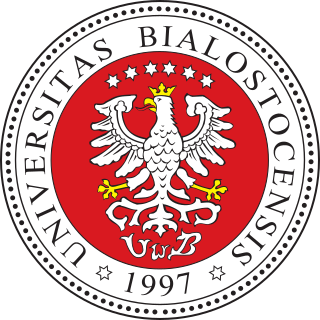
The University of Bialystok is the largest university in the north-eastern region of Poland, educating in various fields of study, including humanities, social and natural sciences and mathematics. It has nine faculties, including a foreign one in Vilnius. Four faculties have been awarded the highest scientific category “A”. The University of Bialystok has the right to confer doctoral degrees in ten fields, as well as postdoctoral degrees in law, economics, chemistry, biology, history and physics.

Brno University of Technology is a university located in Brno, Czech Republic. Being founded in 1899 and initially offering a single course in civil engineering, it grew to become a major technical Czech university with over 18,000 students enrolled at 8 faculties and 2 university institutes.

Vytautas Magnus University Agriculture Academy is a state institution of higher education and research in Lithuania. It is a part of the Vytautas Magnus University. The academy is located in Akademija, west of Kaunas.

The Technical University of Liberec is a university in the city of Liberec, Czech Republic. The university has undergone great transformation in its over sixty-year history. When it was founded, it was called the Institute of Mechanical Engineering in Liberec, and its original classrooms were located in the attics of the F. X. Šalda Grammar School. These later served as accommodation for teachers, and it was here that the first plans and ideas arose concerning the later form and direction of the college. The first 259 students were admitted on October 1, 1953.
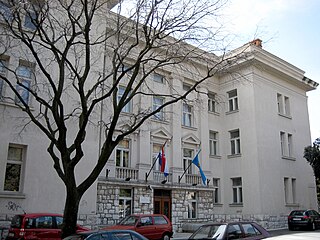
The University of Rijeka is in the city of Rijeka, Croatia, with faculties in cities throughout the regions of Primorje, Istria and Lika.

The Kaunas University of Technology is a public research university located in Kaunas, Lithuania. Established in 1922, KTU has been seen as one of Lithuania's top science education centers. In 2021, KTU was ranked the second-best university in Lithuania.
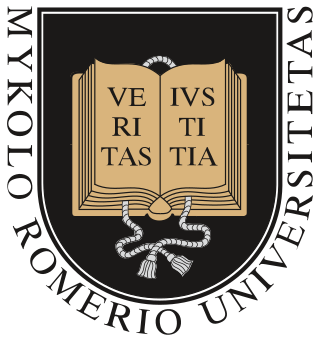
Mykolas Romeris University is an international university located with campuses in Vilnius and Kaunas, Lithuania.
Vilnius University Business School or VU BS is the first business school in Lithuania.

European Humanities University is a private, non-profit liberal arts university founded in Minsk, Belarus, in 1992. Following its forced closure by the Belarusian authorities in 2004, EHU relocated to Vilnius (Lithuania) and thus continues its operations as a private university.

University of the Bundeswehr Munich is one of two research universities in Germany at federal level that both were founded in 1973 as part of the German Armed Forces (Bundeswehr). Originally called Hochschule der Bundeswehr München the institution was supposed to offer civilian academic education for military officers. As an uncommon feature amongst German universities University of the Bundeswehr Munich unifies a more theoretical research university division and a more practical-oriented College of Applied Sciences branch. Today, the university has an increasing number of civilian and international students. The academic year at the university is structured in "trimesters" and not the usual semester, to offer intensive studies with more credit points per year. Very capable students can therefore achieve a bachelor's and a master's degree within less than four years, while this would usually require five years. University of the Bundeswehr Munich has well-established scientific research and forms part of two excellence clusters of the German government's university excellence initiative. The University of the Bundeswehr Munich is one of only very few campus universities in Germany.

Lithuanian Sports University or LSU is a university in Kaunas, Lithuania, specializing in sports, physical activities, and physiology. It is headquartered in Žaliakalnis neighbourhood, in close proximity to the Kaunas Sports Hall and the S. Darius and S. Girėnas Stadium.

Kazimieras Simonavičius University is a private, state-accredited research university in Vilnius, Lithuania. The Ministry of Education and Science of the Republic of Lithuania licensed the former Vilnius Academy of Business Law on August 26, 2003. Teaching started in 2004. In 2012, the university changed its name to honour Kazimierz Siemienowicz, a military engineer, artillery specialist, and pioneer of rocketry.
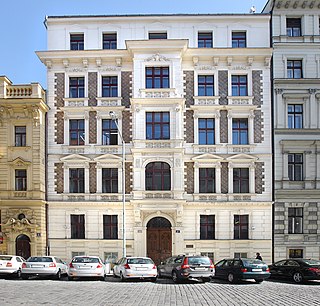
The Faculty of Social Sciences (FSS) is one of the newest faculties of Charles University. The Faculty was founded in 1990, shortly after the Velvet Revolution. It soon became a regional centre of teaching and research in area studies, economics, international relations, journalism, media studies, sociology and political science. The Faculty offers bachelor's, master's, and doctoral degree programs in social sciences. While the languages of instruction are Czech and English, students can choose from classes in a wide range of other languages, including French, German, Russian and Spanish.
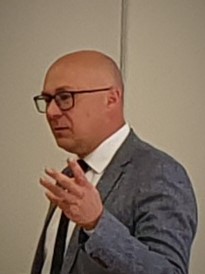
Tomas Davulis is a Lithuanian labour law scholar, professor at Vilnius University and Dean of Vilnius University Faculty of Law.

Vilnius College of Technologies and Design or VTDK is a Lithuanian state institution of higher education

Ventspils University of Applied Sciences is a higher education establishment in Ventspils, Latvia.

Vilnius Gediminas Technical University is a public university located in Vilnius, Lithuania. There are 10 faculties including Antanas Gustaitis Aviation Institute, Architecture, Business Management, Civil Engineering, Creative Industries, Electronics, Environmental Engineering, Fundamental Sciences, Mechanics, Transport Engineering. Scientific research and experimental development is performed by 13 institutes, 3 research centres and 23 research laboratories.
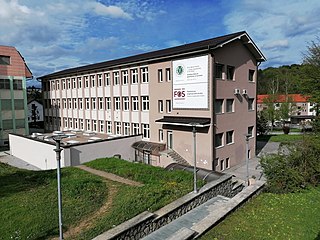
The Faculty of Organisation Studies in Novo Mesto is an independent (private) faculty, in Novo Mesto, Slovenia. The Faculty of Organisation Studies in Novo Mesto holds ISO standards ISO 9001 and ISO/IEC 27001. In 2015, the Faculty was recognised by the Information Commissioner of the Republic of Slovenia for its efforts in the field of personal data protection.

Faculty of Social Sciences is one of the faculties, comprising the University of Ljubljana. It is located at Kardeljeva ploščad.


























